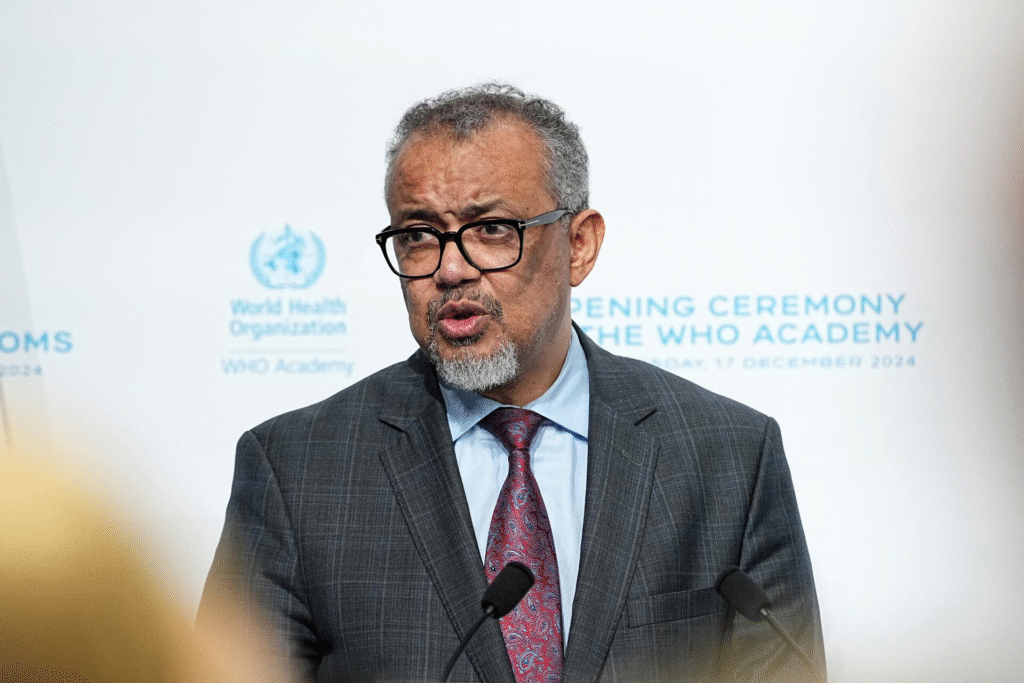On July 18, 2025, the United States government formally rejected the World Health Organization’s revised International Health Regulations (IHR)—a sweeping package of pandemic control amendments adopted by the World Health Assembly on June 1, 2024.
The WHO called it a triumph. The U.S. called it a red line.
And behind that line lies the greatest battle of our age: the right to say no when the world says yes.
A Treaty by Another Name

The 2024 amendments weren’t sold as a treaty. No Senate vote. No public referendum. No constitutional showdown. Just quiet negotiations in Geneva, with diplomats agreeing to redefine what constitutes a pandemic, who gets to declare it, and how fast the machinery of international “cooperation” must respond.
At the heart of the proposal was a new term: “pandemic emergency.”
It would give the WHO broader powers to declare crisis across borders—not just when a virus spreads, but when health systems face “substantial disruption” requiring coordinated international action.

This wasn’t just semantics. It was jurisdiction.
Under the amended Article 13(8), the WHO would also be tasked with facilitating “timely, equitable access” to medical products—including vaccines, diagnostics, and other “health technologies”—in partnership with member states. Article 44bis proposed a global financial mechanism to support those efforts. And Article 54bis created a new committee to ensure countries actually implement what they sign.
In other words: a full-stack bureaucracy for global health governance—built in the image of the COVID-19 response, but made permanent.
The Rejection
The U.S. didn’t just file paperwork. It sent a message.
“We are rejecting them,” said HHS Secretary Robert F. Kennedy Jr., “because nations who accept the new regulations are signing over their power in health emergencies to an unelected international organization.”
He warned the WHO would gain authority to act on “potential public health risks,” without declaring an emergency—then use “systems of risk communication” to enforce “unified public messaging globally.”
“That opens the door,” he said, “to the kind of narrative management and censorship that we saw during the COVID pandemic.”
And behind the amendments? A blueprint for medical surveillance:
“Global systems of health IDs, vaccine passports, and a centralized medical database… It lays the groundwork for global medical surveillance of every human being.”
The Censorship Clause

Buried inside the WHO’s vision of pandemic coordination is something even more insidious than centralized policy: centralized narrative.
Under the amendments, the WHO would be empowered to manage “infodemics” during health emergencies—disinformation campaigns, dissenting voices, alternative hypotheses. But we’ve seen this movie before.
During COVID-19, platforms coordinated with federal agencies to suppress accurate but inconvenient truths:
- The lab-leak hypothesis
- Natural immunity
- Early treatment options
- Vaccine injury data
And they did so under the banner of “protecting public health.”
The WHO’s amendments would formalize that pipeline—from Geneva to Silicon Valley to your feed—all in the name of “global harmony.”
Equity for Whom?

To be clear, the language of “equity” wasn’t a sidebar—it was the hook. Delegations from Africa, Asia, and Latin America rightly remembered how they were shut out during COVID. But what was framed as fairness contained a catch.
While the amended IHR include provisions for equitable access to health products, these obligations remain non-binding and weakly enforced. And when funding, supply chains, or border entry hinge on agreeing to WHO’s “technical guidance,” equity slides into coercion.
A vaccine isn’t care—it’s currency. A funding mechanism isn’t support—it’s leverage.
This isn’t solidarity. It’s technocratic control cloaked in moral language.
The Bigger Picture

This rejection isn’t the end of anything.
It’s the beginning of a deeper reckoning.
The United States has historically been the WHO’s largest funder, contributing billions since 1948. But that relationship has frayed. Trump moved to withdraw. Biden restored funding. Now Trump’s team is walking back in with red pens and a new doctrine: America First includes your immune system.
Meanwhile, negotiations over a separate global “Pandemic Agreement” are still underway, though U.S. participation has cooled. That treaty would go even further—embedding WHO authority into international law, creating legal obligations for surveillance, resource sharing, and emergency mandates.
The stage is being set for the next global showdown.
And the battlefield isn’t a lab or a hospital.
It’s your town. Your home. Your rights.
The Decline of Courage and How We Get It Back
In his 1978 Harvard speech, Soviet dissident and gulag survivor Aleksandr Solzhenitsyn warned:
“A decline in courage may be the most striking feature which an outside observer notices in the West in our days.”
Today, courage looks like skepticism.
It looks like saying no when the experts say “trust us.”
It looks like demanding sovereignty—not just of borders, but of biology.
The WHO calls this rejection a step backward. But maybe it’s a reset.
A chance to build pandemic preparedness without surrender.
A chance to reject the totalitarianism of “emergency measures.”
A chance to remember: quarantine was once a shield. Not a leash.
Because the real question isn’t when the next pandemic begins.
It’s who decides what counts as one.
Find local, sovereign food systems that answer to your community—not Geneva—at BeefMaps.com.




0 Comments